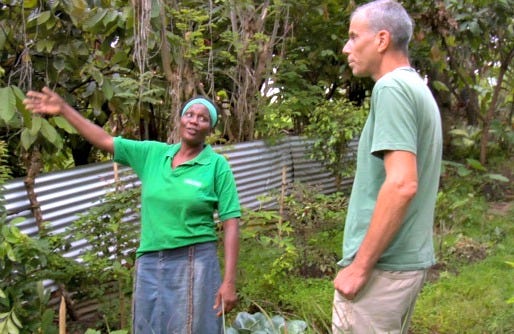Nothing Like Chocolate

The problem with Kum-Kum Bhavnani’s “Nothing Like Chocolate” is that it feels less like an exploration of the international chocolate trade than an infomercial for one guy making chocolate in the rainforests of Grenada.
This documentary is so focused on Mott Green, the founder of The Grenada Chocolate Company Cooperative, that it becomes more his story than the story of chocolate. We feel like we’re only getting a small taste of a bigger tale.
The film starts out like a lot of docs of this ilk do – lamenting the globalization and industrialization of a trade that used to be artisanal and agrarian in nature. A little history provides how chocolate became big business, with low-quality products churned out by machines for sale to the masses.
There’s also some distressing information about how the nation of Ivory Coast has been bedeviled by issues of child slavery being used to harvest the cocoa beans that are then sent across the world to be roasted and processed into the gooey confections people so love to pop in their mouths.
But the bulk of the movie involves following Mott around his ramshackle little factory. A white New Yorker who moved to Grenada several years ago, he wanted to both produce a quality product and give some hope to the local cocoa farmers. Most of them are forced to sell their product to the government for $1.30 a pound to be shipped overseas, whereas Mott pays $2 a pound and employs local workers who turn it into their distinctive bars and cocoa powder, Smilo -- which the neighborhood children have also started applying to Mott as his nickname.
“I’m kind of like the political activist version of Willy Wonka,” he says with a smile. “I have that wildness.”
He’s a mildly striking figure, a beanpole stick of a man in early middle age with a shock of thatchy, graying hair and who runs around in ripped clothes and often no shoes.
But as much time as we spend with Mott, I never really felt like the movie got inside his head. We hear some info about his background as the child of Eastern intellectuals, but he seems to have sprung fully formed in the jungles of Grenada, this mad little figure cooking his batches of chocolate. There’s some footage about a partner who died, but we never so much as learn his last name.
A few interviews with academics and advocates mostly turns into a rah-rah rally for people on the bleeding edge of environmental issues – the sort of folks who consider the labeling of food as “organic” and “Fair Trade” to be too compromised to meet their purist notions of how it should be produced and distributed. Basically, if it wasn’t grown and harvested by a single family, without chemicals of any kind, and processed and prepared by their neighbor, these observers see it as tainted.
One professor/author, reviewing the stimulants contained in chocolate, calls it “the perfect drug for capitalism,” while another supposed expert says that any kind of food that comes from a corporation out to be outlawed.
Of course, little Mott Green puttering around his factory, worrying about production cycles and meeting payroll, is a perfect example of a capitalist who started his own company (a corporation) to make chocolate in a sustainable way -- “tree to bar” as he puts it. “Nothing Like Chocolate” seems unaware of this contradiction.
The film ends with a solicitation to have people text a number on their smartphones to donate to the global cause of slavery-free chocolate. I make no bones about my disdain for advocacy documentaries – observation and illumination are the foundations of this kind of filmmaking, not calls to action. The imperative should be “think about this,” not “do this.”
I did, however, order some of Mott Green’s chocolate. So perhaps the hardline messaging worked. (It was spectacular, btw.)
3 Yaps



